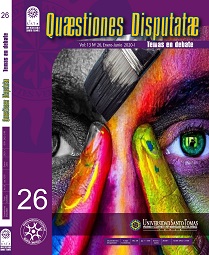O conceito de história em walter benjamin: o desencanto da ideia de progresso
##plugins.themes.bootstrap3.article.main##
Resumo
O texto, sobre o Conceito de História, escrito em XVIII fragmentos e dois apêndices, desenvolve as reflexões de Benjamin em torno do tema da história onde emergem várias categorias: historicismo, materialismo histórico, messianismo, tempo actual, progresso, continuidade. Tem, à primeira vista, um fundo em que os comentadores de Benjamin insistem: o sagrado e o profano, onde estas duas categorias são misturadas, entrelaçadas, dialeticamente interpenetradas. Poderíamos abordar o pensamento de Walter na sua escrita a partir da seguinte tese: o materialismo histórico revela a verdadeira história por detrás da ilusão de progresso, quer como messianismo filosófico, quer como revolução iluminada, onde reside um outro olhar sobre o tempo e o espaço, onde precisamente as vítimas, as silenciadas da história, aparecem. As teses de Walter Benjamin sobre o conceito de história proclamam um desencanto com a ideia iluminada de progresso. Conceitos como "força messiânica fraca" e "comemoração" são conceitos que são repetidamente insistidos como base para a leitura de Benjamin de uma outra forma de ver a filosofia da história.
##plugins.themes.bootstrap3.article.details##
Como Citar
Bautista Roa, M. A. (2020). O conceito de história em walter benjamin: o desencanto da ideia de progresso. Quaestiones Disputatae: Temas En Debate, 13(26), 135-148. Recuperado de http://revistas.ustatunja.edu.co/index.php/qdisputatae/article/view/2013
Seção
Articulos Num.26
De acuerdo a la Licencia Creative Commons Atribución-No Comercial-Sin Derivar 4.0 Internacional, se autoriza leer, descargar, copiar, distribuir, imprimir, buscar o enlazar los textos completos de estos artículos, siempre y cuando se conceda el crédito a los autores de los textos y a la Revista Quaestiones Disputatae: temas en debate, como fuente de publicación original. No se permite el uso comercial de copia o distribución de contenidos, así como tampoco la adaptación, derivación o transformación alguna de estos sin la autorización previa de los autores y de la dirección de Quaestiones Disputatae: temas en debate.

Esta obra está bajo una licencia de Creative Commons Reconocimiento-NoComercial-SinObraDerivada 4.0 Internacional.
Referências
Asselborn, C. J., & Pacheco, O. P. (28-30 de octubre de 2010). La enana encorvada como ancilla liberationis. Recuperado el 01 de mayo de 2013, de Ministerio de justicia y derechos humanos de la República Argentina: http://www.derhuman.jus.gov.ar
Benjamin Walter. Estética y política. Buenos Aires: Las cuarenta, 2009, 156 p.
Frajman Lerner, M. (2003). El mesianismo en el pensamiento de Walter Benjamin. Ciencias Sociales, II (100), 71-76.
Gerzovich, D. (28-30 de octubre de 2010). Walter Benjamin y la teología política: lecturas latinoamericanas. Recuperado el 01 de mayo de 2013, de Centro Cultural de la memoria Harold Conti: http://www.derhuman.jus.gov.ar
Löwy Michel. Walter Benjamin. Aviso de incendio. México: Fondo de Cultura Económica, 2001, 187 p.
Reyes Mate. Medianoche en la historia. Comentarios a las tesis de Walter Benjamin “Sobre el concepto de historia”. Madrid: Trotta, 2006, 344 p.
Roggero, J. (28-30 de octubre de 2010). Centro “Débil fuerza mesiánica”: La teología detrás de la política de la memoria de Walter Benjamin. Recuperado el 01 de mayo de 2013, de Centro Cultural de la Memoria Harol Conti. http://www.derhuman.jus.gov.ar
Yarza, C. (28-30 de octubre de 2010). Benjamin intempestivo. La conexión política-teología en tiempos nihilistas. Recuperado el 01 de mayo de 2013, de Centro Cultural de la memoria Harold Conti: http://www.derhuman.jus.gov.ar
Benjamin Walter. Estética y política. Buenos Aires: Las cuarenta, 2009, 156 p.
Frajman Lerner, M. (2003). El mesianismo en el pensamiento de Walter Benjamin. Ciencias Sociales, II (100), 71-76.
Gerzovich, D. (28-30 de octubre de 2010). Walter Benjamin y la teología política: lecturas latinoamericanas. Recuperado el 01 de mayo de 2013, de Centro Cultural de la memoria Harold Conti: http://www.derhuman.jus.gov.ar
Löwy Michel. Walter Benjamin. Aviso de incendio. México: Fondo de Cultura Económica, 2001, 187 p.
Reyes Mate. Medianoche en la historia. Comentarios a las tesis de Walter Benjamin “Sobre el concepto de historia”. Madrid: Trotta, 2006, 344 p.
Roggero, J. (28-30 de octubre de 2010). Centro “Débil fuerza mesiánica”: La teología detrás de la política de la memoria de Walter Benjamin. Recuperado el 01 de mayo de 2013, de Centro Cultural de la Memoria Harol Conti. http://www.derhuman.jus.gov.ar
Yarza, C. (28-30 de octubre de 2010). Benjamin intempestivo. La conexión política-teología en tiempos nihilistas. Recuperado el 01 de mayo de 2013, de Centro Cultural de la memoria Harold Conti: http://www.derhuman.jus.gov.ar

